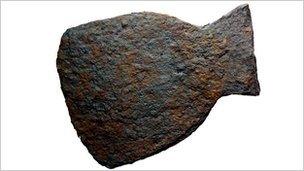Viking axe head discovery is 'evidence of battle'
- Published

Archaeologists think the axe head could be evidence of a battle in 894 AD
A Viking axe head found in a Gloucestershire village could be evidence of a battle more than 1,100 years ago, according to archaeologists.
The wrought iron object, found in Slimbridge in 2008, has now been identified as being of Viking origin.
Historians say a band of Vikings sailed up the River Severn and fought against the Anglo-Saxons in 894 AD.
Archaeologists say where the axe head was found is where they could have tied up their ships.
It was discovered by Ian Hunter Darling under a hedge in his garden.
Bloody battle
"I couldn't believe what I saw. I thought it could have been an agricultural implement of some description," he said.
He said an archaeological visit to the farm where he lives had got the experts "quite excited".
"They said I should take it to a museum to have it looked at."
According to historians King Alfred the Great fought the Vikings in a bloody battle at Minchinhampton, about 10 miles from Slimbridge, in 894 AD.
Three Viking princes were killed in the battle, and fighting could have ranged over a wide area of the Berkeley Vale.
For over a century archaeologists have speculated where the Vikings could have moored their ships.
"They realised my driveway would have been creek in those days before there was a sea wall on the River Severn," said Mr Hunter Darling.
"The boats could have tied up at the bottom of my garden."
'Viking sword'
Members of Slimbridge local history society now want to gather further evidence of Viking activity in the village.
Peter Ballard, from the society, said: "A member of a local family claimed he found a Viking sword in a ditch by the River Cam many years ago, but that has now been lost."
They are asking for residents who may have found other Viking objects to come forward.
A meeting to highlight the importance of the discovery will be held in Slimbridge Village Hall on 21 February.
The axe head is to go on display at Stroud Museum in the Park.